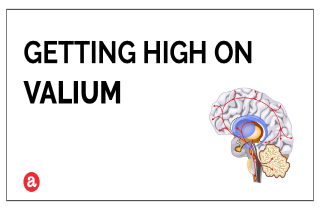Yes. Valium can get you high.
But Valium is very addictive, and a tolerance to the medication can develop over time when it’s not used as directed. Here, we examine Valium used for medical and recreational reasons, how the medication effects the brain, and the dangers of Valium abuse. And we invite your questions about Valium use at the end.
Valium chemistry and use
Valium contains a benzodiazepine drug, diazepam. Diazepam is used to treat the symptoms of anxiety, control muscle spasms and seizures. It’s also used to help alcoholics who are going through withdrawal symptoms. Diazepam works by decreasing brain activity. Most benzodiazepines stay in your system for a long time and can be detected in urine for up to a month after use.
Valium and euphoria
Valium is used recreationally because of its fast-acting effects. Valium also can produce a euphoric high and is often used in conjunction with other drugs. Valium might be used in conjunction with alcohol to accentuate the effects of both drugs, or to relieve the agitation and irritability that go along with a cocaine binge.
Mixing Valium with other substances
Valium is not likely to cause death taken on its own. However, mixed with other depressants Valium can be very dangerous. Opioids and alcohol are two examples. Mixing Valium with depressant drugs increases the risk of overdose or serious adverse effects.
Valium and central nervous system effects
Valium depresses the central nervous system. This causes relaxation and the relief of tension and anxiety. Some of the adverse effects Valium has on the central nervous system include:
- anterograde amnesia
- delirium
- hallucinations
- lack of coordination
- slowed reaction time
- slurred speech
Can you get addicted to Valium?
Yes. You can get addicted to Valium.
In fact, Valium is very addictive. This is why it’s usually only prescribed for short-term use of four months or less. Valium creates a physical tolerance and dependence in its users. In other words, Valium becomes less effective over time. This means that people using Valium to get high will have to start taking larger and larger doses to get any effect. It’s also very hard to quit Valium because of the nasty withdrawal effects.
Learn more about Tranquilizer Addiction and Treatment Program considerations, what you can do to address it, and your long-term rehab and recovery options. Help is available TODAY!
Help for Valium abuse
The good news is that there’s help out there if you’re addicted to Valium. Benzodiazepine abuse is a widespread and common problem, and there are community resources available to help you kick the habit.
Long term abstinence from Valium can be achieved, if you are willing to do what is necessary to get better. First, you’ll want to talk to a doctor about gradually weaning yourself off the medication – stopping abruptly can be unpleasant and occasionally dangerous, causing heart problems, increased blood pressure, or even seizures. Then, you need to address the psychological and emotional issues which compel Valium use.
Questions about Valium high
Do you have questions about the euphoric effect of Valium, Valium addiction or its treatment? Please leave us your questions here. We invite all real questions about Valium use and will do our best to respond to your questions in a personal and prompt reply.









Related Posts